The Most Popular Nursing Programs & Degrees Explained

Nursing programs come in many forms, ranging from short-term certificates and diplomas to advanced doctoral degrees. Understanding how each program type differs in length, admissions, tuition, and licensing outcomes can help you choose the right path for your career goals. On this page, we explain and compare the most popular nursing programs and degrees, including certificate, associate, bachelor, master, and doctoral options, along with common bridge programs for working professionals.
Non-Degree Programs
Training Certificates and Diplomas in Nursing
Non-degree programs in nursing do not result in an academic degree such as an Associate or Bachelor. Instead, they offer widely recognized certificates or diplomas that prepare students for entry-level roles like Licensed Practical Nurse (LPN). Titles such as Practical Nursing Certificate, Practical Nursing Diploma, and Practical Nurse Training are often used to describe these types of programs. Non-degree programs can offer a more affordable path into nursing, help students start working sooner, strengthen college applications, and provide a way to explore the field before committing to a longer degree program.

Certified Nursing Assistant
- Program Length: 6 to 12 weeks
- License Exam: Written, Clinical
- Tuition Cost: $500 to $2,500

Licensed Practical Nursing
- Program Length: 1 to 1.5 years
- License Exam: NCLEX PN
- Tuition Cost: $1,500 to $8,000

Diploma in Nursing
- Program Length: 1 to 2.5 years
- License Exam: NCLEX PN or RN
- Tuition Cost: $1,500 to $8,000
The title Licensed Vocational Nursing (LVN) is used in the states of California and Texas. Elsewhere in the United States, the equivalent role is known as Licensed Practical Nurse (LPN). Both LPN and LVN students take the same NCLEX-PN exam. Other entry-level nursing programs, such as Nurse Aide and Nurse Technician, are similar in function and training to the more widely recognized Certified Nursing Assistant (CNA) role.
Degree Programs
Associate, Bachelor, and Master Degrees in Nursing
Degree program types such as an Associate of Science in Nursing (ADN), Bachelor of Science in Nursing (BSN), and Master of Science in Nursing (MSN) are offered by traditional colleges and universities and increasingly through online and hybrid formats. Students eager to become a Registered Nurse (RN) typically enroll in either an Associate or Bachelor degree program. Some schools also prepare students to take the CNA and LPN exams along the way to becoming an RN.

Associate Degree Nursing
- Program Length: 2 years
- License Exam: NCLEX RN
- Tuition Cost: $2,500 to $18,000

Bachelor Degree Nursing
- Program Length: 4 years
- License Exam: NCLEX RN
- Tuition Cost: $5,000 to $63,000

Master Degree Nursing
- Program Length: 2 years
- License Exam: NCLEX RN, APRN
- Tuition Cost: $16,000 to $75,000
Bridge Programs
Transitional Degrees for Healthcare Professionals
Bridge nursing programs help nurses who have already completed a CNA, LPN, LVN, or RN program advance their education or licensure more quickly. These transitional types of degree programs are also available to medical assistants, emergency medical technicians, paramedics, military nurses, and foreign-trained nurses. Many nursing bridge programs are now available online or in hybrid formats in addition to traditional on-campus options.
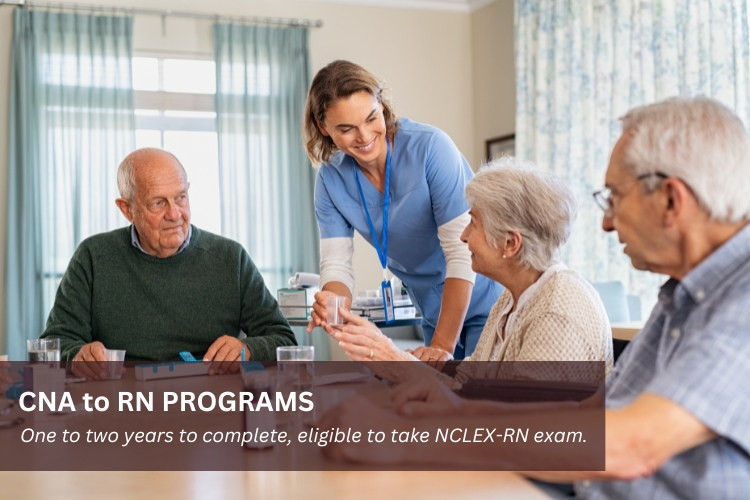
CNA to RN Bridge
- Program Length: 1 to 2 years
- License Exam: NCLEX RN
- Tuition Cost: $5,000 to $18,000
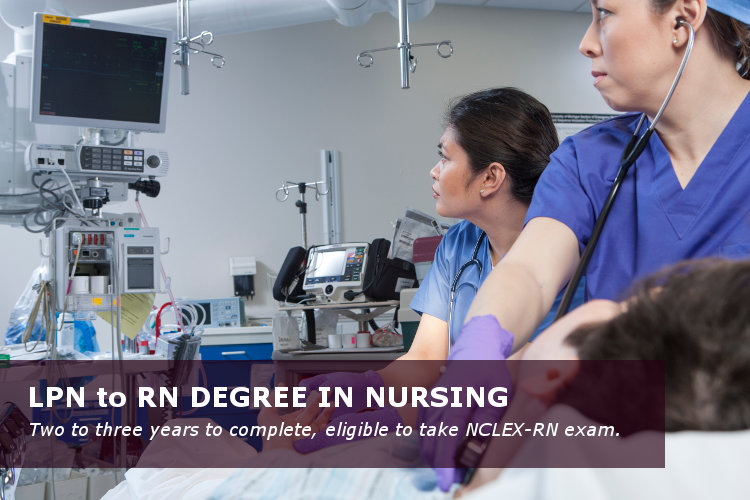
LPN to RN Bridge
- Program Length: 1 to 2 years
- License Exam: NCLEX RN
- Tuition Cost: $5,000 to $18,000
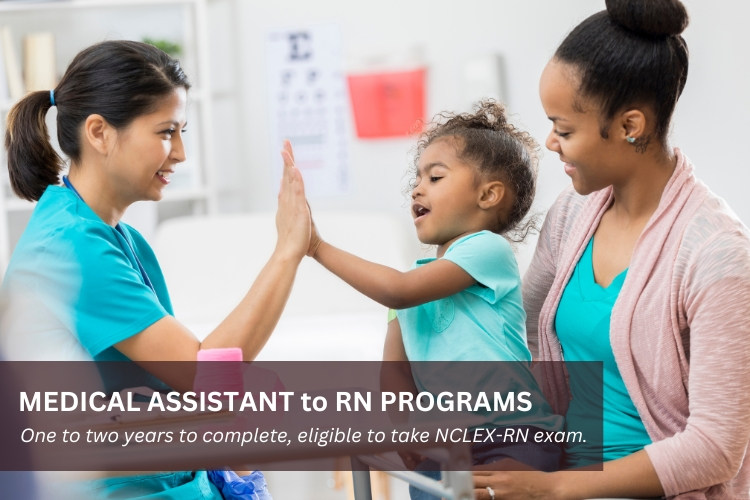
MA to RN Bridge
- Program Length: 1 to 2 years
- License Exam: NCLEX RN
- Tuition Cost: $5,000 to $18,000
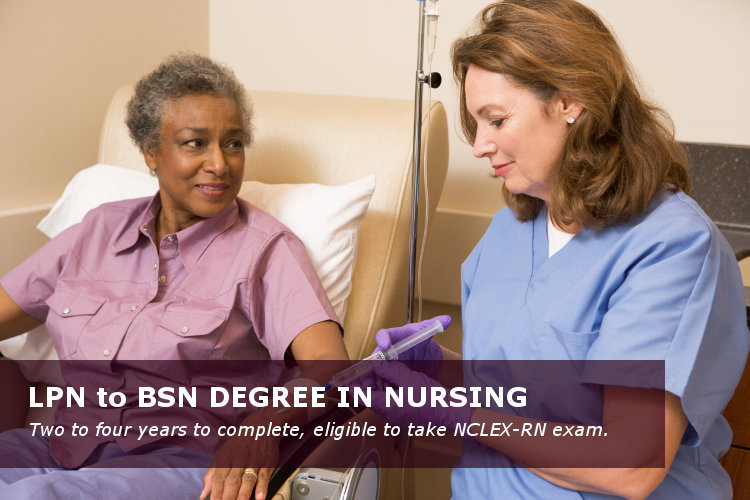
LPN to BSN Bridge
- Program Length: 2 to 4 years
- License Exam: NCLEX RN
- Tuition Cost: $5,000 to $63,000

RN to BSN Bridge
- Program Length: 1 to 2 years
- License Exam: NCLEX RN
- Tuition Cost: $5,000 to $63,000

RN to MSN Bridge
- Program Length: 2 to 4 years
- License Exam: NCLEX RN, APRN
- Tuition Cost: $16,000 to $70,000
The program title LVN to RN Bridge is used in California and Texas, where the Licensed Vocational Nurse (LVN) role replaces the more widely used Licensed Practical Nurse (LPN) title. Both LVN to RN and LPN to RN programs follow the same NCLEX-RN licensing path. Another option to explore is Pre-Nursing Studies (PRE), which can help students complete prerequisites before enrolling in a degree or bridge program.
Post-Master's
Graduate-Level Certificates and Doctoral Degrees in Nursing
Graduate-level and doctoral-level nursing programs such as a Post-Master of Science in Nursing (Post-MSN), Doctor of Nursing Practice (DNP), and Doctor of Philosophy in Nursing (PhD) are typically offered by larger universities and colleges that specialize in nursing. These programs are often available in part-time, online, or hybrid formats to accommodate working professionals. Students pursuing Advanced Practice Registered Nurse (APRN) roles commonly enroll in MSN, Post-Master, or Doctoral degree programs. Those interested in academic research or teaching may prefer a PhD in Nursing.
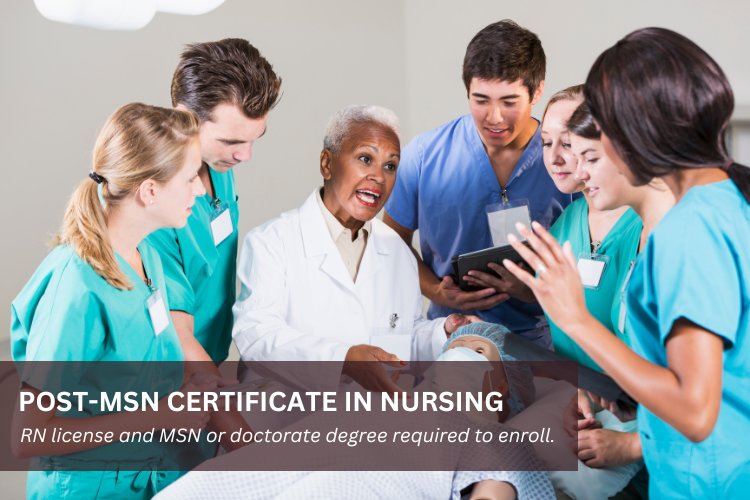
Post-MSN Certificate
- Program Length: 1 to 2 years
- License Exam: Specialty
- Tuition Cost: $16,000 to $35,000
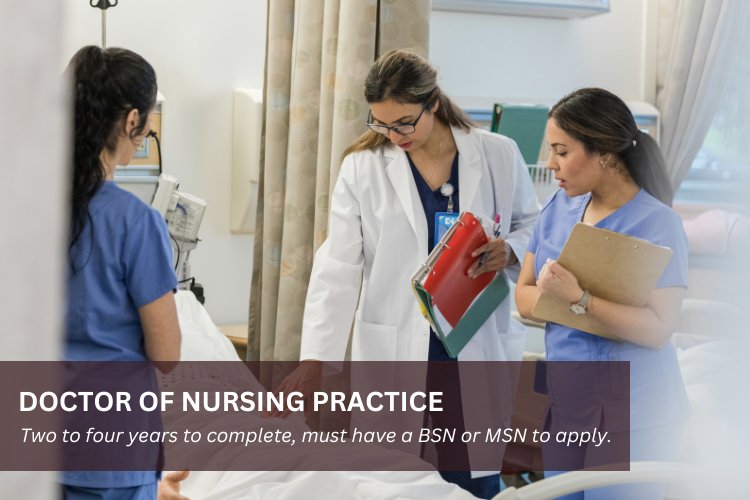
Doctor of Nursing Practice
- Program Length: 2 to 4 years
- License Exam: Specialty
- Tuition Cost: $16,000 to $75,000

PhD in Nursing
- Program Length: 4 to 6 years
- License Exam: Specialty
- Tuition Cost: $0 to $45,000
The Doctor of Nursing Practice (DNP) is increasingly offered in place of the MSN for those seeking primary care roles such as Family Nurse Practitioner or Adult-Gerontology Nurse Practitioner. While a Post-MSN certificate can still qualify nurses for APRN licensure, many schools are transitioning to the DNP as the preferred clinical degree.
Compare
Nursing Program Comparison Chart
The chart below summarizes the most common nursing programs, grouped by program type. These are the same programs highlighted earlier on this page. The comparison chart includes typical program lengths, licensing exam outcomes, annual tuition range (lowest to highest), and minimum entry requirements. Use this information as a starting point to compare your nursing education options side by side.
| Program | Length | License Exam | Tuition* | Entry Requirements |
|---|---|---|---|---|
| Non-Degree Programs | ||||
| Certified Nursing Assistant (CNA) | 6 to 12 weeks | Written, Clinical | $500 to $2,500 | May require high school diploma or GED (varies by state) |
| Licensed Practical Nursing (LPN) | 1 to 1.5 years | NCLEX-PN | $1,500 to $8,000 | High school diploma or GED |
| Licensed Vocational Nursing (LVN) | 1 to 1.5 years | NCLEX-PN | $1,500 to $8,000 | High school diploma or GED |
| Diploma in Nursing (DIP) | 1 to 2.5 years | NCLEX-PN or RN | $1,500 to $8,000 | High school diploma or GED |
| Degree Programs | ||||
| Pre Nursing Studies (PRE) | 2 years | NCLEX-RN | $2,500 to $18,000 | High school diploma or GED (community college) |
| Associate Degree in Nursing (ADN) | 2 years | NCLEX-RN | $2,500 to $18,000 | High school diploma or GED (community college) |
| Bachelor of Science in Nursing (BSN) | 4 years | NCLEX-RN | $5,000 to $63,000 | High school diploma or GED (4-year college) |
| Master of Science in Nursing (MSN) | 2 years | NCLEX-RN, Specialty | $16,000 to $75,000 | BSN, active RN license, may require experience |
| Bridge Programs | ||||
| CNA to RN Bridge | 1 to 2 years | NCLEX-RN | $5,000 to $18,000 | CNA certification, high school diploma or GED |
| EMT to RN Bridge | 1 to 2 years | NCLEX-RN | $5,000 to $18,000 | EMT certification, high school diploma or GED |
| LPN to RN Bridge | 1 to 2 years | NCLEX-RN | $5,000 to $18,000 | Active LPN license |
| LVN to RN Bridge | 1 to 2 years | NCLEX-RN | $5,000 to $18,000 | Active LVN license |
| Medical Assistant to RN Bridge | 1 to 2 years | NCLEX-RN | $5,000 to $18,000 | Medical assistant certification, high school diploma or GED |
| Paramedic to RN Bridge | 1 to 2 years | NCLEX-RN | $5,000 to $18,000 | Paramedic certification, high school diploma or GED |
| LPN to BSN Bridge | 2 to 4 years | NCLEX-RN | $5,000 to $63,000 | Active LPN license |
| RN to BSN Bridge | 1 to 2 years | Specialty (if applicable) | $5,000 to $63,000 | Active RN license, ADN or diploma in nursing |
| RN to MSN Bridge | 2 to 4 years | Specialty | $16,000 to $75,000 | Active RN license, ADN or BSN, may require experience |
| Post-Master's & Doctoral Programs | ||||
| Post-MSN Certificate | 1 to 2 years | Specialty | $16,000 to $35,000 | MSN, active RN license |
| Doctor of Nursing Practice (DNP) | 2 to 4 years | Specialty | $16,000 to $75,000 | MSN or BSN (varies), active RN license |
| PhD in Nursing | 4 to 6 years | Specialty | $0 to $45,000 | MSN or related graduate degree, active RN license |
* Tuition reflects the estimated first-year price quoted by the colleges and universities found in our database. Multiply the annual tuition by the program length to estimate the total program tuition cost. CNA programs are shorter in length. Therefore, the tuition shown estimates the full tuition for the program. Total program costs will vary and may include substantial amounts of additional fees, including books, medical equipment, clinicals, and room and board.
Last updated: August 15, 2025
References:
- How to Become a Registered Nurse. Bureau of Labor Statistics, U.S. Department of Labor, Occupational Outlook Handbook, Registered Nurses. Retrieved August 15, 2025.
- What is accreditation and why is it important?. For Students, Accreditation Commission for Education in Nursing. Retrieved August 15, 2025.
- Student Guidelines and Information. Texas Board of Nursing. Retrieved August 15, 2025.
- National Center for Education Statistics. US Department of Education, Institute of Education Sciences. Retrieved August 15, 2025.
- Cost of Attendance. State University System of Florida. Retrieved August 15, 2025.
- In-State Tuition. Vermont State University, Undergraduate Students. Retrieved August 15, 2025.
- See the Average College Tuition in 2024-2025. U.S. News, Paying for College. Retrieved August 15, 2025.
- Current Tuition. California State University, Undergraduate, Credential, Graduate and Doctoral Programs. Retrieved August 15, 2025.
- Tuition & Fees for School of Nursing Programs. University of Rochester School of Nursing. Retrieved August 15, 2025.
- DNP Tuition and Fees. Columbia School of Nursing. Retrieved August 15, 2025.
